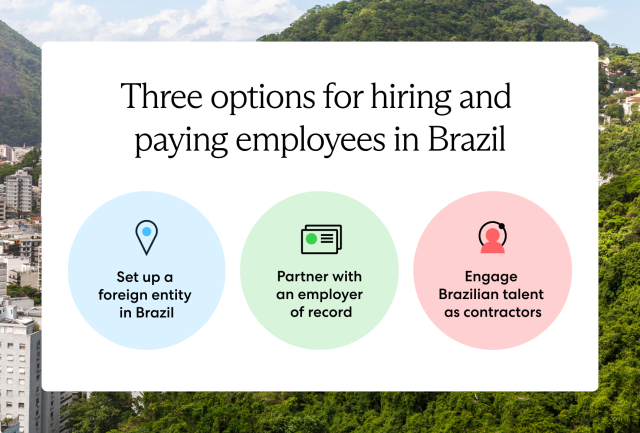Brazil’s highly skilled workforce is a valuable resource for many global companies. Home to tech giants like IBM and Google, its innovative talent pool has experience working alongside the best in the industry.
Still, hiring employees in Brazil comes with unique hurdles—issues like permanent establishment and misclassification create serious compliance risks that can lead to fines and time-consuming litigation.
Fortunately, hiring in Brazil doesn’t have to be a headache. This guide summarizes everything you need to know about compliantly hiring employees in Brazil, from risk mitigation to calculating total employee cost.
Plus, find out how to hire employees in Brazil from anywhere without setting up a local entity.
Can I hire an employee from Brazil?
Yes, you can hire employees in Brazil from another country. By establishing a Brazilian entity, partnering with an employer of record (EOR), or hiring local contractors, global companies can compliantly engage Brazilian talent from anywhere and enjoy the many growth opportunities Latin America’s most populous country has to offer.
How to hire in Brazil from another country: 3 options
Global companies can hire employees in Brazil in one of three ways:
- Set up a local entity. Entity establishment reduces your risk exposure and enables direct hiring, though it’s costly and time-consuming.
- Partner with an employer of record (EOR). An EOR is a third-party entity that serves as the legal employer of your global workforce. An EOR hires, pays, and manages your international employees while ensuring compliance.
- Hire Brazilian contractors. Hiring contractors is a flexible, affordable alternative to hiring employees, though it involves unique risks and limits growth.
We discuss each of these approaches in detail below.

1. Set up a legal entity in Brazil
Setting up a legal entity in Brazil allows you to establish a local branch or foreign subsidiary and hire Brazilian employees directly. With a local entity, you can handle employee logistics internally and cut down employment costs in the long run.
Entity establishment makes sense if you plan to hire a large team and establish a long-term presence in Brazil. However, setting up an entity is costly and time-consuming—most companies have to wait several months or years before legally engaging talent in their target market.
If you’re not ready to make long-term investments in the Brazilian market, consider partnering with an employer of record instead.
2. Use an employer of record (EOR)
The simplest way to hire employees in Brazil without limiting your long-term growth opportunities is to partner with a Brazilian EOR.
An EOR is a third-party entity with global infrastructure and international legal expertise that streamlines the process of hiring international employees without setting up local entities.
Think of an EOR as your global HR team—they handle everything from hiring, onboarding, and compliance to running global payroll, administering global benefits, and offering ongoing HR support to your international workforce.
Whether you want to test the waters of the Brazilian market before making long-term investments or engage talent while undergoing local incorporation, an EOR makes it possible.
Learn more: What Is an Employer of Record (EOR)?
3. Hire contractors in Brazil
Another option for quickly building a Brazilian workforce is to engage contractors. Engaging international contractors offers global companies added flexibility and the opportunity to hire specialized talent for short-term projects.
This approach saves companies time and money by simplifying the onboarding process and streamlining payroll since employers don’t have to withhold payroll taxes and contributions from contractor wages. However, engaging international contractors exposes companies to serious misclassification risks.
Correctly classifying your contractors ensures they receive the rights they are entitled to under local labor regulations. However, the factors determining correct employee classification in Brazil are challenging to navigate.
Without an HR team with local legal expertise, foreign employers can easily overlook their misclassification risk and subject themselves to lengthy and costly legal entanglements.
We discuss this topic in more detail below.
Read also: Hire a Contractor vs. Employee: Which Is Best For Your Business?
How much does it cost to hire an employee in Brazil?
The cost of hiring an employee in Brazil is, at a minimum, 33.8% of the employee’s base salary. This is because the employer must contribute 20% of the employee’s salary to social security, 5.8% to social assistance, and 8% to the pension fund, or Fundo de Garantia do Tempo de Serviço (FGTS).
Employers must also make varying contributions to a work accident insurance scheme, pay vacation accrual, and provide 13th-month pay to their employees.
Interested in hiring employees in Brazil? Use our employee cost calculator below to get reliable insights into employee costs and payroll contributions in Brazil:
What are the employment practices in Brazil?
Employment practices in Brazil are similar to those of many other countries, with some unique differences. For instance, a standard workday in Brazil is eight hours, and the probationary period is 90 days. However, all employees in Brazil are entitled to a 13th-month salary.
Familiarizing yourself with local employment practices is critical for ensuring compliance while hiring in Brazil. Below, we provide a list of standard employment practices that all global companies operating in this market should know:
- Minimum wage. The minimum wage in Brazil is BRL 1,412 per month, corresponding to roughly BRL 67 per day or BRL 9 per hour. Local employers must comply with the regional wage in states where the regional minimum wage is higher than the federal wage.
- 13th-month pay. All employees in Brazil are entitled to an annual bonus, called 13th-month pay, equivalent to 1/12 of their monthly wage multiplied by the number of months they worked that year. Employers usually pay it in two installments: one by November 30 and the other by December 20.
- Working hours. Standard working hours in Brazil are eight hours per day and 44 hours per week.
- Probationary period. The maximum probationary period in Brazil is 90 days.
- Termination. In case of termination without cause, employers must give employees a minimum of 30 days’ notice plus three additional days for each year of service, capped at 90 days. Employees must provide 30 days’ notice for resignations.
- Severance. In case of termination without cause, employees receive a salary balance, accrued vacation pay, one-third of their vacation bonus, and a proportional 13th-month salary. Employers must also contribute 40% to the balance in the employee’s FGTS fund, which the employee can access while receiving unemployment insurance.
- Annual leave. Employees who have worked for their employer for one year receive 30 days of paid annual leave.
- Maternity leave. Female employees in Brazil who have worked for their employer for more than 3 months receive 120 days of paid maternity leave, which they can extend up to 180 days.
- Paternity leave. Fathers are entitled to five days of paid paternity leave, extendable up to 20 days.
- Sick leave. Employers pay sick or injured employees their full wages for the first 15 days of sick leave. After that, Brazil’s National Institute of Social Security pays the employee a sick leave benefit calculated as a percentage of their regular wage, capped at BRL 7,507 (US$1,503) per month.
- Public holidays. Employees in Brazil are entitled to eight national holidays plus any applicable regional holidays.
Compliance risks when hiring in Brazil
In addition to navigating local employment practices, global companies hiring in Brazil must familiarize themselves with employee classification, payroll taxes, permanent establishment regulations, and data compliance.
The penalties for violating local employment regulations range from fines to total bans on doing business in Brazil. Below, we discuss the primary compliance risks global companies face while operating in this market, including tips on how to mitigate risk.
Worker misclassification
Misclassification poses a serious risk to global companies that hire international contractors instead of employees. The complex and evolving nature of classification regulations worldwide makes it especially challenging for foreign employers to ensure compliance.
Even if you correctly classify a contractor at the start of your working relationship, as your influence over them shifts and local regulations evolve, you may face a litany of legal hangups.
Consider the following example: A British IT company hires a Brazilian contractor for a one-off project. Upon project completion, the IT company offers the contractor additional project work on an indefinite basis and asks the contractor to sign a non-compete agreement.
According to Brazilian regulations, engaging talent indefinitely under an exclusive work arrangement constitutes an employer-employee relationship. Unaware of this fact and failing to reclassify their contractor, the British IT company subjects itself to penalties ranging from employee back pay, tax arrears, and fines to legal fees, liquidated damages, and injunctions.
By enlisting a third-party legal expert, you can mitigate misclassification risk altogether. When seeking counsel, remember to choose a well-vetted partner with experience in the Brazilian market that stays on top of evolving local regulations.
Read more in our complete guide to employee and contractor misclassification.
Incorrect payroll contributions
Another serious compliance risk that global companies face while managing international teams is running compliant global payroll. Mandatory payroll taxes and contributions in Brazil include federal income tax, Social Security (INSS), work accident insurance (RAT), the pension fund (FGTS), and social assistance.
Contribution rates for some funds in Brazil, such as INSS, vary between industries, and collective bargaining agreements (CBAs) often require additional contributions, such as life insurance or meal vouchers.
The Brazilian government also requires 13th-month pay. As previously mentioned, this is a mandatory annual employee bonus amounting to one month’s pay, or 1/12 of the employee’s annual salary.
Understanding the nuances of Brazilian payroll tax regulations is critical for ensuring compliance, avoiding errors, and providing timely payments to your Brazilian workforce. It also facilitates accurate labor burden calculations, helping you budget for hiring costs as you build a distributed workforce across the country.
Consider enlisting a third-party expert, such as an EOR, to ensure payroll compliance and avoid fines, limited business opportunities, and other penalties while paying your Brazilian team.
Learn more: Payroll and Tax in Brazil: Overview for Global Employers
Immigration and visa requirements
The majority of talent you hire in Brazil will likely be Brazilian citizens who require no visas or immigration procedures to legally reside and work in the country.
Still, you may encounter a scenario where you must hire a foreign national. Or, perhaps you have employees interested in relocating to Brazil as part of your global mobility policy.
Either way, you’ll need to ensure your HR team has the necessary background and skills to navigate Brazilian immigration and visa procedures and determine which visas or permits your team needs to legally reside and work there.
For remote teams, it’s worth noting Brazil’s digital nomad visa, which allows foreign professionals to live, travel, and work in Brazil. Anyone who can prove their ability to work remotely for a company that’s located outside of Brazil can apply for it. The visa is valid for one year with the possibility of extending it for another year.
Permanent establishment
If a company operates with a fixed presence in a foreign country and generates revenue in that country, local authorities usually deem that organization a permanent establishment, subjecting it to local corporate taxation.
The same is true with Brazil, and despite its connotations, the term ‘fixed presence” doesn’t necessarily refer to a local corporate office or brick-and-mortar business. Doing business in any capacity in Brazil can easily trigger permanent establishment.
For instance, if you partner with an agent in Brazil who closes contracts on behalf of your company, this can trigger permanent establishment.
Global companies hiring employees in Brazil must familiarize themselves with the country’s permanent establishment laws to ensure they satisfy their corporate tax obligations and avoid fines, limited business opportunities, and other penalties.
Data compliance
In 2018, in a move to align with global data management standards, Brazil established the Brazilian General Data Protection Act, or the Lei Geral de Proteção de Dados (LGPD). Inspired by the EU’s General Data Protection Regulation (GDPR), the LGPD applies to any company whose operations or service offerings involve data handling in Brazil.
The LGPD regulates various aspects of personal data usage across the country, including the collection and use of personal data without consent and the use of personal information for unlawful or unfair discrimination.
Noncompliance penalties include fines of up to 2% of company revenue, capped at BRL 50 million per violation, as well as embargoes, suspensions, and total bans on doing business in Brazil. Today, any company that collects, handles, stores, or shares personal data in Brazil must practice due diligence to ensure its data handling practices comply with LGPD regulations.
Easily hire in Brazil with Velocity Global
Navigating Brazilian employment law can be a major headache. Simplify hiring employees in Brazil and eliminate the risk by partnering with Velocity Global.
Our EOR solution makes it easy for global companies to quickly and compliantly build, manage, and support distributed teams in over 185 countries, including Brazil, without establishing entities or worrying about violating local employment regulations.
We handle everything from hiring, onboarding, and risk mitigation to running global payroll and offering ongoing HR support so you can build a distributed workforce in Brazil without the added burden. Plus, our team of local experts can help you craft locally tailored benefits to ensure your company is an attractive landing spot for top Brazilian talent.
Let us handle the heavy lifting so you can build your dream team in Brazil without skipping a beat. Contact Velocity Global today to get started.



